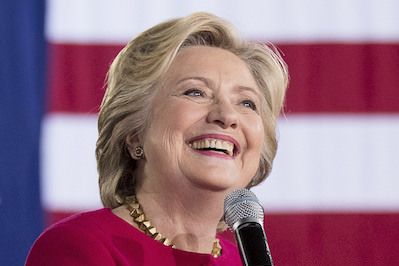Hacked Emails Show Clinton Suggesting She Hides Her True Policy Positions From the Public
The candidate's supporters in the media have long insisted that she is fundamentally honest. Now, emails hacked allegedly from the account of Clinton campaign chairman John Podesta tell a far different story.

Hillary Clinton at a campaign event in early October. (Andrew Harnik / AP)
Earlier this year, Jill Abramson, former executive editor of The New York Times, penned a column for The Guardian titled, “This may shock you: Hillary Clinton is fundamentally honest.”
Today, it is clear that this assertion is not true. Thanks to emails hacked allegedly from the account of Clinton’s campaign chairman John Podesta, and published by Julian Assange and WikiLeaks, we read of Clinton telling a group of real estate developers, financiers and property owners in April 2013 that, as a politician, “you need both a public and a private position” on policies.
“Politics is like sausage being made,” she said. “It is unsavory, and it always has been that way, but we usually end up where we need to be. But if everybody’s watching, you know, all of the back room discussions and the deals, you know, then people get a little nervous, to say the least.”
To support her argument in the article, Abramson cited PolitiFact, “a Pulitzer prize-winning fact-checking organization,” as giving Clinton “the best truth-telling record of any of the 2016 presidential candidates.” (The political magazine Current Affairs published an excellent critique of PolitiFact’s famed “Truth-O-Meter” this August.) Readers can decide for themselves whether PolitiFact deserves its Pulitzer and Abramson the trust and faith of her audience.
Responding to the leaked comments, Glen Caplin, spokesman for Clinton’s national presidential campaign, said: “We are not going to confirm the authenticity of stolen documents released by Julian Assange [of WikiLeaks] who has made no secret of his desire to damage Hillary Clinton. Guccifer 2.0 has already proven the warnings of top national security officials that documents can be faked as part of a sophisticated Russian misinformation campaign.”
The emails contain excerpts from speeches Clinton gave to major Wall Street banks, including Goldman Sachs. “If genuine,” The Guardian wrote of the documents, “the WikiLeaks emails appear to show Clinton enjoying warm relations with Wall Street and admitting she is ‘far removed’ from ordinary citizens.”
After leaving office as secretary of state in 2013, Clinton embarked on a lucrative career giving speeches to elite banks and other financial institutions. Tax returns show that she charged a minimum of $225,000 per speech.
The Guardian continues:
In a speech to the Goldman Sachs Builders And Innovators Summit in October 2013, Clinton apparently complained of “a bias” against successful people in Washington that stops them retaining their wealth. …
… “You go to Washington. Right. But, you know, part of the problem with the political situation, too, is that there is such a bias against people who have led successful and/or complicated lives. You know, the divestment of assets, the stripping of all kinds of positions, the sale of stocks. It just becomes very onerous and unnecessary.”
At the same event, Clinton appears to have discussed the 2008 financial crisis. “I think that there’s a lot that could have been avoided in terms of both misunderstanding and really politicizing what happened with greater transparency, with greater openness on all sides, you know, what happened, how did it happen, how do we prevent it from happening?”
The former senator and secretary of state added: “The people that know the industry better than anybody are the people who work in the industry” – a comment that might have been seized on by Sanders, who was demanding that Wall Street not be given a free hand to self-regulate. …
In remarks to Banco Itaú, she allegedly spoke in favor of trade in a tone very different from her current opposition to Barack Obama’s Trans-Pacific Partnership. “My dream is a hemispheric common market, with open trade and open borders, some time in the future with energy that is as green and sustainable as we can get it, powering growth and opportunity for every person in the hemisphere.
“Secondly, I think we have to have a concerted plan to increase trade already under the current circumstances, you know, that Inter-American Development Bank figure is pretty surprising. There is so much more we can do, there is a lot of low-hanging fruit but businesses on both sides have to make it a priority and it’s not for governments to do but governments can either make it easy or make it hard and we have to resist, protectionism, other kinds of barriers to market access and to trade[.]”
The excerpts were revealed in a January 2016 email from Tony Carrk, research director of the Clinton campaign, to Podesta and other senior campaign officials, highlighting politically sensitive sections.
.
Your support matters…Independent journalism is under threat and overshadowed by heavily funded mainstream media.
You can help level the playing field. Become a member.
Your tax-deductible contribution keeps us digging beneath the headlines to give you thought-provoking, investigative reporting and analysis that unearths what's really happening- without compromise.
Give today to support our courageous, independent journalists.






You need to be a supporter to comment.
There are currently no responses to this article.
Be the first to respond.